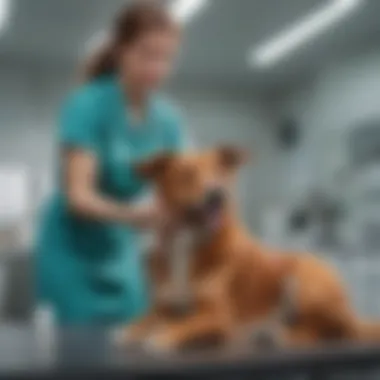Effective Strategies to Stop Diarrhea in Dogs


Intro
Diarrhea in dogs is a significant concern for many pet owners. This condition can stem from a range of factors, including dietary choices, infections, and even stress. Understanding how to manage this issue is crucial for maintaining a dog’s health and comfort. In the following sections, we will explore various strategies to stop diarrhea in dogs, including identifying causes, effective home remedies, dietary adjustments, and knowing when to seek veterinary advice. Each approach aims to equip you with the knowledge necessary to enhance your dog's wellbeing.
Understanding Your Pet
Breed Traits
Different dog breeds exhibit unique traits that can influence their digestive health. Breeds like bulldogs and boxers may suffer from food sensitivities, while others may be prone to infections due to their environment. Knowing your dog's breed can help tailor preventive measures against diarrhea. Recognizing specific dietary needs and possible allergies is essential for preventing digestive issues.
Common Temperaments
A dog's personality may also affect its digestive health. An anxious dog may eat quickly or exhibit stress-related diarrhea. Understanding your pet’s temperament can guide you in managing its feeding schedule and environment. Dogs that are more relaxed typically have better digestion, while highly active or nervous dogs may require more focused attention to their eating habits.
Special Needs
Some dogs have special dietary or health needs that affect their digestion. Older dogs often experience changes in gut health or mobility, which can lead to digestive upset. Consulting a veterinarian ensures that these specific needs are met, reducing the likelihood of diarrhea.
Pet Care Essentials
Nutrition and Feeding Guidelines
A balanced diet is crucial for a dog's overall health. Providing high-quality, breed-appropriate food can prevent many digestive problems. Consider the following guidelines:
- Choose foods with easily digestible proteins.
- Avoid sudden dietary changes; introduce new foods gradually.
- Monitor your dog's reaction to new treats or supplements.
Grooming Tips and Techniques
Regular grooming plays an indirect role in preventing diarrhea. Keeping your pet clean reduces the likelihood of skin infections that can lead to gastrointestinal issues. Regular baths, proper nail trimming, and brushing maintain good hygiene.
Health and Wellness
Routine health check-ups can catch potential issues early, including those that lead to diarrhea. Vaccinations, deworming, and preventative treatments against parasites should not be overlooked. Pet owners must ensure that their dogs are up-to-date with these health protocols.
When to Seek Veterinary Care
If diarrhea persists for more than a day or is accompanied by other symptoms such as vomiting or lethargy, veterinary care is necessary. Prolonged diarrhea can lead to dehydration and more serious health issues. Always err on the side of caution when it comes to your pet’s health.
A veterinary professional can offer insights into the underlying causes of diarrhea and recommend an appropriate treatment plan.
In summary, being aware of your pet’s breed traits, temperaments, and special needs can create a strong foundation for preventing diarrhea. A comprehensive approach to nutrition, grooming, and health ensures that your dog maintains optimal wellbeing.
Understanding Diarrhea in Dogs
Diarrhea in dogs is more than just an inconvenience; it can signal potential health issues that warrant attention. Understanding this condition is vital for dog owners. Recognizing the various causes and symptoms allows owners to respond appropriately. This knowledge often can change outcomes for their pets. Diarrhea can lead to dehydration, making it crucial to monitor your dog's well-being.
What Causes Diarrhea in Dogs
Diarrhea can arise from many factors. Some common causes include:
- Dietary indiscretion: Dogs often explore their environment with their mouths. Eating garbage, spoiled food, or foreign objects can upset their stomachs.
- Infections: Bacterial, viral, or parasitic infections can also lead to diarrhea. Common culprits include parvovirus and giardia.
- Changes in diet: Abrupt dietary changes without gradual transitions can trigger digestive disturbances.
- Medications: Some drugs can have gastrointestinal side effects.
- Underlying health issues: Conditions such as pancreatitis or inflammatory bowel disease might contribute to chronic diarrhea.
Understanding these factors assists in preventing and managing diarrhea effectively. Owners should consider their dog's habits and environment regularly. This vigilance is key to keeping their pets healthy.
Common Symptoms to Observe
When assessing diarrhea in dogs, several symptoms to observe are crucial. While diarrhea itself is the primary indicator, accompanying signs often provide more context:


- Frequency of bowel movements: Increased urgency to defecate can be a major sign something is wrong.
- Consistency of stool: Watery stools are more concerning than softer, formed ones.
- Vomiting: This may accompany diarrhea, indicating a more serious issue.
- Loss of appetite: Dogs that refuse to eat might have underlying health problems.
- Lethargy: A reduction in energy can signal illness.
Always monitor your dog for changes in behavior. This can provide helpful clues in determining the severity of the condition.
Contacting a veterinarian is advised if symptoms worsen or persist. Early intervention is often better for long-term health. Awareness of these symptoms promotes vigilant care, ensuring a happy and healthy dog.
Types of Diarrhea
Understanding the types of diarrhea is crucial in effectively addressing this common issue in dogs. Each type has its own characteristics, causes, and implications for treatment. This section will clarify the distinctions between acute and chronic diarrhea, aiding dog owners in recognizing the specific symptoms their pets may exhibit.
Acute Diarrhea
Acute diarrhea is a sudden onset condition that lasts for a short duration. It might occur due to various factors, including dietary changes, infections, or exposure to toxins. The key indicators of acute diarrhea include frequent, watery stools appearing unexpectedly. Sometimes, this condition may resolve on its own, but the owner must be vigilant about observing the dog’s behavior.
Here are some of the typical causes of acute diarrhea:
- Dietary indiscretion: Sudden changes in diet or eating spoiled food.
- Infections: Bacterial or viral infections can prompt digestive distress.
- Parasites: Intestinal parasites can result in considerable gastrointestinal upset.
When managing acute diarrhea, it is essential to ensure that the dog remains hydrated. Offering small amounts of water can help maintain fluid intake and prevent dehydration. In most cases, a period of fasting combined with a bland diet can help the digestive system reset.
Chronic Diarrhea
Chronic diarrhea, on the other hand, is defined by its persistence, often lasting for more than three weeks. This condition can suggest underlying health issues that require further investigation. Chronic diarrhea may be linked to conditions such as inflammatory bowel disease, food allergies, or even metabolic disorders. Some dogs may also experience recurrent episodes, complicating diagnosis.
Common symptoms of chronic diarrhea may include:
- Weight loss: The dog may lose weight due to poor nutrient absorption.
- Increased frequency of defecation: Stools may be loose but not as watery as those in acute cases.
- Change in appetite: The desire to eat may decrease, or the dog may appear lethargic.
Identifying the specific cause of chronic diarrhea often requires a visit to the veterinarian. Diagnostic tests may include blood work, fecal examinations, or ultrasound, depending on the signs presented. Early intervention is critical to manage chronic diarrhea effectively and mitigate health risks.
Understanding the type of diarrhea your dog has can guide you in choosing the appropriate treatment and preventative strategies. It is important to evaluate the severity and duration of the symptoms carefully.
Recognizing the Severity of Diarrhea in Dogs
Recognizing the severity of diarrhea is crucial for any dog owner. It enables timely intervention and appropriate treatment, which can often mean the difference between minor discomfort and severe health issues. Understanding the nuances of diarrhea can guide owners toward effective home remedy options or indicate when professional veterinary assistance is necessary. Given the diverse causes of diarrhea, discerning its severity becomes an essential skill for any devoted pet caretaker.
Mild Cases vs.
Severe Cases
Diarrhea is not a one-size-fits-all condition. It manifests in varying degrees of severity. Mild cases may be characterized by soft stools with only occasional watery bowel movements. These instances often result from simple dietary indiscretion. Common triggers might include sudden changes in diet, minor stress, or a temporary response to spoiled food. In such cases, observing the dog, ensuring hydration, and implementing conservative home remedies will usually suffice.
On the contrary, severe cases present significant symptoms that may indicate serious underlying health issues. Dogs showing frequent, watery stools, blood in their feces, or persistent vomiting fall into this category. These symptoms can point toward infections, intestinal obstructions, or more complex metabolic problems. If these signs are observed, immediate veterinary consultation is paramount. It is important to prioritize the health of the dog and not delay seeking professional help.
Identifying Dehydration Risks
Dehydration is a major concern with diarrhea. When a dog loses fluids through frequent bowel movements, it can quickly reach a state of dehydration. This risk amplifies in severe cases. Observing a dog's hydration status is essential, as even mild diarrhea can lead to significant fluid loss. Common signs of dehydration include dry gums, lethargy, and, in some cases, skin that does not quickly return to its normal position when pinched.
Pet owners can perform a simple skin test to check hydration. Gently pinch the skin on the back of the dog's neck and release. The skin should quickly return to its original position. If it remains tented or takes time to go back, hydration support is needed.
If you notice signs of dehydration, it is critical to encourage your dog to drink water or consider using electrolyte solutions designed for pets. In severe situations, continuous loss of fluids often necessitates intravenous fluid therapy. This underscores the importance of recognizing the severity of diarrhea early to prevent complications that could arise from dehydration.
Identifying severity and dehydration risks enhances the owner's ability to manage their dog's health effectively. Properly assessing these aspects can lead to faster and more targeted interventions.
Being diligent in monitoring diarrhea symptoms and their progression empowers owners to take appropriate action, safeguarding their pet's well-being.
Home Remedies for Mild Diarrhea


Understanding home remedies for mild diarrhea is crucial for dog owners seeking immediate relief for their pets. Diarrhea can be distressing for both the dog and the owner. While it may not always indicate a severe health problem, managing it effectively is important. Home treatments can help stabilize the dog's digestive system and provide comfort until further action is required if symptoms persist. In this section, we will explore a few practical solutions that pet owners can implement at home.
Fasting and Hydration
Fasting may sound extreme, but it can actually benefit dogs experiencing mild diarrhea. By allowing the digestive system to rest, temporary fasting gives the gut time to recover. Typically, a 12 to 24-hour fast is recommended for adult dogs, while puppies may require shorter fasting periods. During this time, providing adequate hydration is essential. Water allows the dog to maintain electrolyte balance and prevents dehydration, which is a serious concern during gastrointestinal upset. You can also offer diluted chicken broth or electrolyte solutions specially formulated for pets. Avoid sugary drinks or milk, as they may exacerbate the issue.
Bland Diet Recommendations
After the fasting period, a bland diet should be introduced gradually. The goal is to ease the stomach back into a regular eating pattern while minimizing further irritation. Simple foods can include:
- Boiled white rice
- Plain boiled chicken (without skin and bones)
- Canned pumpkin (plain, not pie filling)
- Boiled potatoes (without butter or seasoning)
These options contain low fat and fiber, assisting in firming up stools. Introduce these foods slowly, observing how your dog responds. If symptoms improve, you can slowly transition back to their regular diet over a few days.
Probiotics and Their Benefits
Probiotics are beneficial microorganisms that may assist in restoring a healthy balance of gut flora. They can be especially useful during or after episodes of diarrhea. By aiding digestion, probiotics can improve nutrient absorption and bolster the immune system. When selecting a probiotic, aim for products formulated specifically for dogs, as the strains of bacteria they contain will be more effective. Consult your veterinarian about appropriate strains and dosages for your pet's specific needs. While not a cure-all, they can be a supportive method when dealing with mild diarrhea.
Incorporating these home remedies can help alleviate mild diarrhea in dogs, allowing owners to provide immediate care and comfort.
Dietary Adjustments
Dietary adjustments play a crucial role in managing diarrhea in dogs. The right nutrition can help restore balance in a dog's digestive system. It is essential to consider what a dog eats, as certain foods may worsen the condition. Proper adjustments can aid recovery and minimize the risk of recurrent diarrhea. Thus, understanding how to choose and transition to suitable dog food is vital.
Choosing the Right Dog Food
When selecting dog food, it’s important to consider ingredients and nutritional content. High-quality dog food made of digestible ingredients can promote better gut health. Look for formulas that list real meat as the first ingredient. Avoid foods with fillers such as corn and soy, as they may irritate the digestive system.
It can be helpful to choose food with added probiotics. Probiotics support healthy gut flora, which aids digestion. A balance of fiber is also beneficial. Soluble fiber, such as beet pulp, can help in forming stools, while insoluble fiber aids in gut motility.
Transitioning to a New Diet Safely
Transitioning to a new diet should be done gradually. A sudden change can lead to further digestive upset. Start by mixing the current food with the new food in a ratio. For the first few days, use 75% old food and 25% new food. Monitor your dog's response during this period.
If your dog tolerates the mixture well, gradually adjust the ratio over the course of a week. Move to 50% old food and 50% new food for several days, then 25% old food and 75% new. Finally, after about two weeks, your dog should be fully transitioned to the new diet.
Ensuring that the new food is acceptable to your dog is paramount. Observe for any signs of discomfort or allergic reactions, such as itching or changes in stool consistency. If any adverse reactions occur, consult your veterinarian promptly. Safe transitions promote better acceptance and digestion of the new food.
Using Over-the-Counter Remedies
Using over-the-counter remedies can be a practical approach for managing diarrhea in dogs. These products are designed to address mild to moderate cases of diarrhea, helping to restore normal digestive function. However, it is important to remember that not all remedies are suitable for every dog. Therefore, understanding their benefits and limitations is crucial for pet owners seeking effective solutions.
Over-the-counter products often include antidiarrheal medications and herbal supplements. These solutions can provide quick relief and reduce the frequency of bowel movements. However, they are best used after consulting with a veterinarian, especially if diarrhea persists beyond 24 hours or is accompanied by other concerning symptoms.
Safe Antidiarrheal Products
When considering over-the-counter antidiarrheal products, it is essential to choose those that are specifically labeled for dogs. Some common safe options include:
- Bismuth subsalicylate (such as Pepto-Bismol) can help soothe the gastrointestinal tract and reduce discomfort.
- Loperamide (Imodium) is known to decrease the frequency of diarrhea by slowing down intestinal movement. However, this can cause constipation in some cases, so dosage must be carefully monitored.
Before using any product, check guideline for dosage based on the dog’s weight. Also, closely monitor the dog for any adverse reactions.
"Always consult a veterinarian before administering any over-the-counter medication to ensure it is safe for your dog, especially if the dog has existing health concerns or is taking other medications."
Some products penetrate the bloodstream quickly and can lead to complications, so it’s always better to be cautious.
Herbal Supplements for Digestive Support


Herbal supplements can also play a role in alleviating diarrhea in dogs. They can offer a more natural approach to digestive health and may enhance overall gut function. Some commonly used herbal remedies include:
- Slippery elm: Known for its demulcent properties, slippery elm coats the digestive tract, soothing irritation and inflammation.
- Pumpkin powder: Rich in fiber, it helps firm up loose stools while providing essential nutrients.
- Probiotics: These beneficial bacteria can restore the natural balance of gut flora, which is often disrupted during bouts of diarrhea.
As with any treatment, it is suggested to introduce these supplements gradually. Observing how the dog reacts to each new addition is important for preventing further gastrointestinal distress. Additionally, always seek advice from a veterinarian when combining treatments or introducing new supplements.
When to Consult a Veterinarian
Identifying when to seek professional help for your dog's diarrhea is a crucial consideration for any pet owner. Early intervention can significantly impact the overall health and well-being of your dog. In many cases, diarrhea may resolve itself with home remedies and dietary adjustments. However, there are situations that necessitate a visit to the veterinarian. Knowing these situations helps avoid potential complications.
Signs That Require Immediate Attention
Certain symptoms indicate that your dog's condition may be severe and require immediate veterinary attention. Here are several signs to watch for:
- Persistent diarrhea lasting more than 24 hours: If diarrhea continues for over a day, it may indicate an underlying health issue that needs to be addressed.
- Blood in the stool: Blood can be a sign of a more serious condition such as infections, parasites, or even tumors.
- Lethargy: If your dog seems unusually tired or less active than normal, this may indicate dehydration or systemic illness.
- Vomiting: Frequent vomiting alongside diarrhea can quickly lead to dehydration and should be evaluated by a vet.
- Signs of dehydration: Symptoms such as dry gums, sunken eyes, and excessive thirst are critical signs that must not be overlooked.
- Abdominal pain or bloating: If your dog shows discomfort when you touch its stomach or if there's noticeable swelling, it may indicate a blockage or other serious problem.
Each of these signs reflects conditions that should not be taken lightly. Acting quickly when these symptoms arise can help ensure the best outcome for your pet.
Understanding Diagnostic Tests
When you take your dog to the veterinarian for diarrhea, a range of diagnostic tests may be conducted to pinpoint the cause. Understanding these tests is essential for pet owners to feel informed and involved in their dog’s care.
- Fecal examination: This test checks for parasites and bacteria in the stool. It can identify common pathogens like Giardia or hookworms.
- Blood tests: A complete blood count and biochemistry panel assess the overall health of your dog. These tests can indicate issues with liver or kidney function, which may impact digestion.
- X-rays or ultrasounds: Imaging tests help diagnose any structural problems, such as blockages or tumors, that might be affecting your dog’s digestive tract.
- Endoscopy: In certain cases, vets may recommend endoscopy to see inside the intestines. This test can help identify inflammatory bowel disease or other concerns.
Each diagnostic test serves a critical role in formulating an appropriate treatment plan. The information gained from these tests allows the veterinarian to recommend the most effective strategies to address your dog's diarrhea.
Always consult your veterinarian if you are unsure about the severity of your dog’s condition. Their expertise will help guide you through the process of diagnosis and treatment.
Preventive Measures
Preventive measures play a crucial role in ensuring the overall health of dogs and effectively combatting diarrhea. Recognizing that prevention is often more effective than treatment, dog owners must focus on specific elements to minimize the risk of gastrointestinal upset. A balanced diet, appropriate vaccinations, and regular health assessments are all essential components of a preventive strategy. Implementing these measures reduces the likelihood of diarrhea and enhances the dog’s environmental resilience.
Maintaining a Balanced Diet
A balanced diet is foundational for promoting a dog's digestive health. Many instances of diarrhea stem from dietary indiscretion. Dogs can experience upset stomachs when they consume inappropriate foods or sudden changes in their diet. To prevent this:
- Choose High-Quality Dog Food: Select dog food approved by veterinary nutritionists. The foodshould be appropriate for your dog's age, weight, and health condition.
- Introduce New Foods Gradually: Whenever changing your dog’s diet, make transitions slow. A change should happen over a week to allow the digestive system to adjust.
- Limit Table Scraps and Treats: Although giving dogs some human food may seem harmless, many human foods can be harmful. Stick to dog-specific treats and limit extras.
- Include Digestive Aids: Consider dog food that has probiotics, as these promote gut health and can help prevent diarrhea.
By maintaining a balanced diet, dog owners can significantly reduce the risk of dietary-related diarrhea.
Regular Vet Check-Ups
Regular vet check-ups are essential for maintaining the health of your dog. These visits allow for early diagnosis of health issues that may lead to diarrhea. During these examinations, the vet can assess your dog's overall health, update vaccinations, and perform necessary screenings. Dog owners should be aware of the following:
- Preventive Care: Regular check-ups can help prevent diseases that often manifest in gastrointestinal symptoms.
- Vaccination Status: Keeping vaccinations up-to-date protects dogs from infections that can lead to diarrhea.
- Weight Monitoring: Vets can track weight changes, which may indicate health issues, including digestive problems.
- Behavioral Observations: Vets can also help identify if your dog displays unhealthy eating habits or stress-related behaviors.
The key to preventing issues is not just treatment, but regular preventive care to maintain health.
Investing time in regular vet visits and a balanced diet can save dog owners from dealing with the stress of acute illnesses, maintaining peace of mind in pet care.
Closure
Incorporating home remedies, like fasting and hydration, can provide immediate relief for mild cases. Furthermore, adjusting the dog’s diet to include high-quality foods designed for digestive health is crucial. Over-the-counter solutions are available, but caution is necessary. Always consult a veterinarian before introducing any new treatment.
Regular veterinary check-ups play a significant role in prevention. They help catch issues early and provide insights into any necessary lifestyle adjustments. The importance of being proactive rather than reactive cannot be overstated. By keeping these guidelines in mind, dog owners can better maintain their pets' health, significantly decreasing the incidence of diarrhea.
Summarizing Key Takeaways
The key takeaways from this article include:
- Recognizing the causes of diarrhea is essential for effective prevention and treatment.
- Implementing home remedies can be beneficial for mild cases, particularly hydration and a bland diet.
- Always consider dietary adjustments when addressing digestive issues.
- Over-the-counter products might help, but they should be used under the guidance of a veterinarian.
- Regular veterinary visits are important for preventive care and early detection of possible health issues.
Dog owners who apply these strategies can create a more robust framework for their pets’ health and comfort. Nurturing a solid understanding of these aspects will enhance both the owner's ability to manage their dog’s health and the overall relationship they share.



